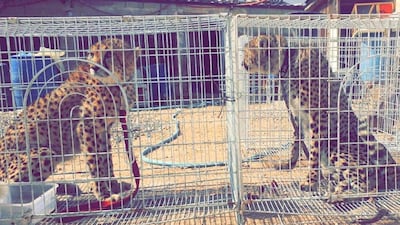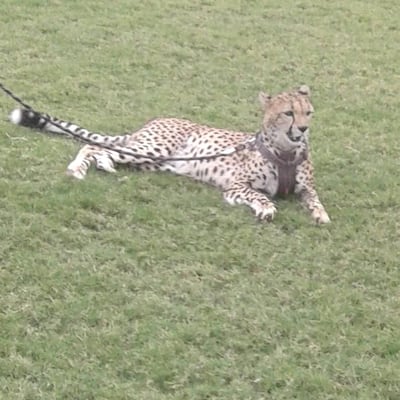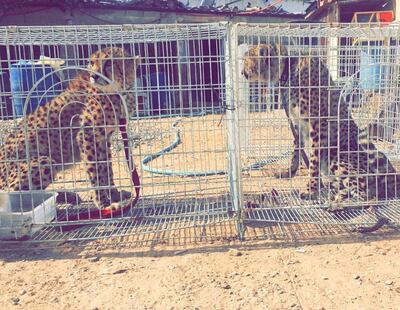Cheetahs are portrayed on social media as the perfect pet or status symbol. Some are filmed playing on the couch, others on expensive yachts – but all too many are available to buy.
Two years on since member governments of the Convention of International Trade in Endangered Species of Wild Fauna and Flora agreed on measures to halt cheetah trafficking in the GCC, little has changed.
The International Union for Conservation of Nature categorises the cheetah as a “vulnerable” animal, just one step below “endangered”, in its red list of threatened species.
There are estimated to be fewer than 7,000 cheetahs in existence in the wild across the globe. Since 2016, 34 cheetahs have been offered for sale in the UAE on Instagram.
The most recent advertisement reported by animal welfare groups appeared on Instagram on June 30. Advertisements are also placed on Facebook and other social media channels. Prices range between Dh35,000 for two cats and Dh50,000 for one animal.
One Instagram advertisement targeting UAE buyers is selling a 17-month-old cheetah for Dh37,000. Its seller claims the wild animal is “playful” and 100 per cent healthy.
“The latest information is that animals are flowing again into the UAE,” said the head of an international conservation agency.
“Many of these are being advertised on Instagram. Unfortunately, people in the UAE are being more careful about posting cheetahs on social media, so it is becoming harder to monitor.”
The Dubai branch of the International Fund for Animal Welfare monitors websites and social media posts offering wildlife for sale, reporting cases to authorities.
“There are many indicators to consider when evaluating whether it’s getting better or worse, but we’ve noticed a positive change in the public’s behaviour and attitude towards these activities,” said Kinda Jabi, who works with the fund.
“Keeping a wild animal at home, especially a cheetah, is considered to some people a great way to keep a high social status. Times have changed. It used to seem cool, now it’s viewed as inhumane.
“With so many awareness campaigns, people have started raising their voices against it.”
Rates of detection, arrest and conviction for wildlife crimes remain low, and the trade is endangering the future of species.
Anti-trafficking charities and non-government organisations are aiming for an 80 per cent reduction in online wildlife trafficking by 2020, with a change in public attitudes in the GCC key to that aim.
“The real goal is to have communities and people understand the negative impact these activities have on wildlife,” Ms Jabi said.
“We co-operate closely with the concerned authorities to reach people through awareness campaigns and report any incidents we monitor to the authorities with the belief that they will take the right action.
“Other than that, we’re on the ground protecting endangered animals and executing animal rescues.”
The parent company of Instagram, Facebook, is a member of the Global Coalition to End Wildlife Trafficking Online. Its policies prohibit poaching and selling endangered species and their parts.
Facebook has introduced flags that allows users to report suspicious posts, which are then removed within 24 hours.
Automated and manual checks on Facebook Marketplace help to prevent the sale of all animals and a law enforcement online request system is open for regulators to access data for criminal investigations.
Animal trafficking is estimated to be the fourth most valuable illegal activity after drugs, counterfeit products and human trafficking.
The UN Environment Programme says the trade is estimated to be valued at between $50 billion (Dh183.66bn) and $150bn a year. Since 2016, the GCC has been a lucrative market for animal traffickers.
More than 200 cheetahs have been made available from traffickers in Saudi Arabia, with prices ranging from 5,000 riyals (Dh4897) to 50,000 riyals for one cat.
Five advertisements for cats were found in Kuwait, two were identified in Qatar and seven more in Jordan and Bahrain.
_________________
Read more:
Lion heads and ivory: Dubai border patrols halt more than 50 illegally trafficked species
Big cats continue to be sold in UAE via social media despite federal law
Cut out the middle man in exotic animal trade to kill market, expert says
__________________
In 2016, the convention called on a wider publication of penalties associated with the trade to deter traffickers and to highlight the conservation impact of the industry.
It supports strengthening national and regional enforcement agencies involved in key trade points, by exchanging intelligence with Interpol and the World Customs Organisation.
The convention’s notice encouraged authorities to work together to close known smuggling routes between East Africa and the Middle East.
The UAE Ministry of Climate Change and Environment has said it is working with the private sector and the Telecommunications Regulatory Authority to track illegal online advertisements.
Although figures for confiscations are not available, the ministry said numbers were decreasing.
Under federal law, only zoos, wildlife parks, circuses, breeding and research centres are entitled to keep dangerous, wild or exotic animals.
Tech company Google has specific policies banning advertisements related to the trading of threatened or extinct animals, and encourages the reporting of them so they can be removed.
“In addition to requiring our advertisers to adhere to local law, we have robust policies in place to govern which ads may appear on Google,” a spokeswoman said.
“We enforce these policies rigorously. When a violation is brought to our attention we take swift action.”




